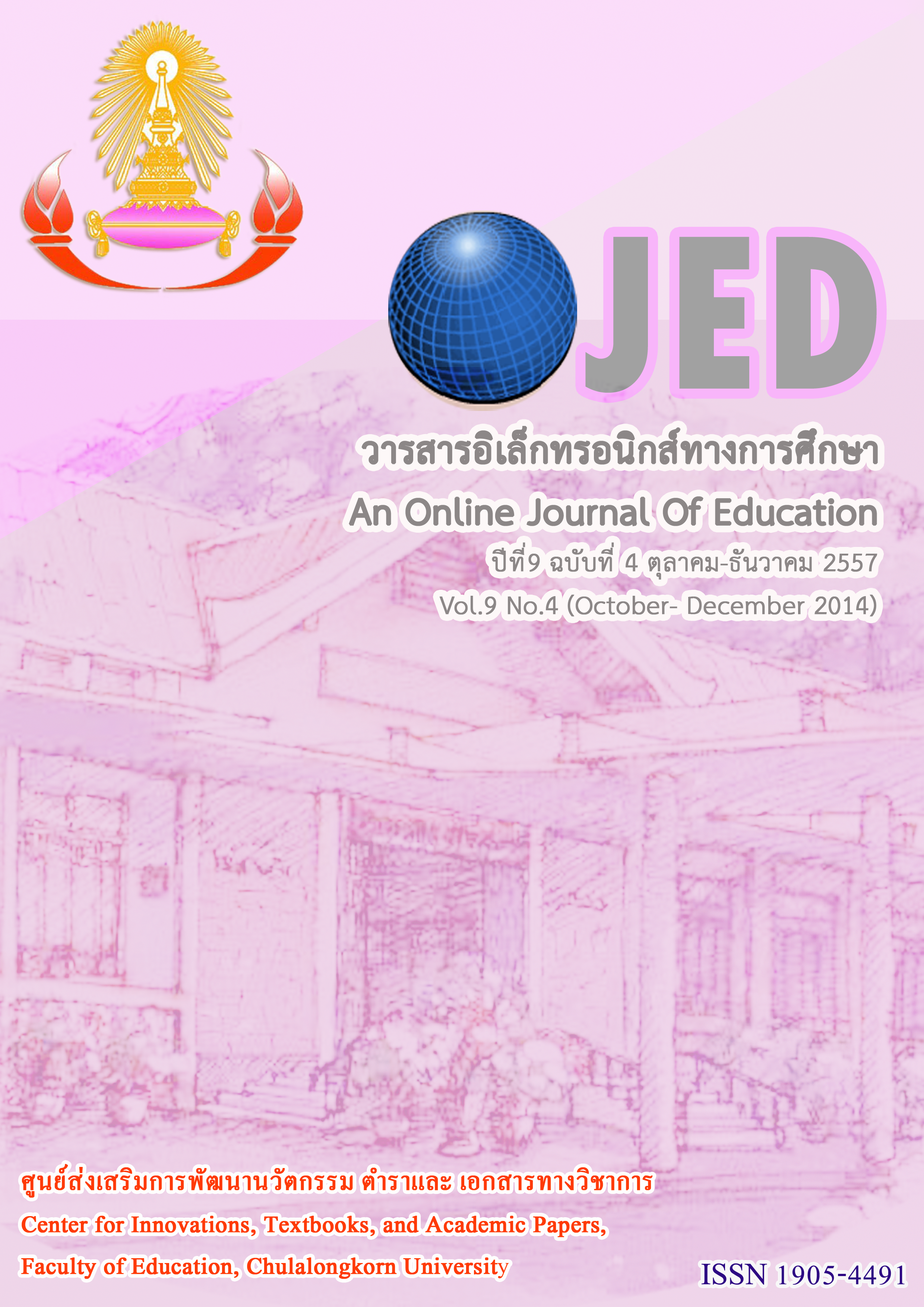พัฒนาการทักษะการตั้งกระทู้ธรรมของสามเณรโดยใช้บล็อกตามวิธีคิดแบบวิภัชชวาท
Keywords:
พุทธวิธีคิดแบบวิภัชชวาท, การคิดอย่างมีวิจารณญาณ, ประโยคนำ, ทักษะการตั้งกระทู้ธรรม, คะแนนพัฒนาการ, บล็อก, VIPATCHAWAT THINKING, CRITICAL THINKING, GUIDING SENTENCE, DHRAMA QUERY SKILLS, GROWTH SCORE, BLOGAbstract
บทคัดย่อ
การวิจัยครั้งนี้มีวัตถุประสงค์เพื่อ 1) เปรียบเทียบคะแนนทักษะการตั้งกระทู้ธรรมของนักเรียนหลังเรียนโดยการเขียนบล็อกสะท้อนการเรียนรู้ตามวิธีคิดแบบวิภัชชวาทที่มีประโยคนำ และการเขียนบล็อกสะท้อนการเรียนรู้ตามวิธีคิดแบบ วิภัชชวาท และ 2) เปรียบเทียบคะแนนพัฒนาการทักษะการตั้งกระทู้ธรรมตามการคิดอย่างมีวิจารณญาณของนักเรียนหลังการเรียนโดยการเขียนบล็อกสะท้อนการเรียนรู้ตามวิธีคิดแบบวิภัชชวาทที่มีประโยคนำ และการเขียนบล็อกสะท้อนการเรียนรู้ตามวิธีคิดแบบวิภัชชวาท กลุ่มตัวอย่างในการวิจัยคือ พระภิกษุ-สามเณร ที่กาลังศึกษาชั้นมัธยมศึกษาปีที่ 5 โรงเรียนบาลีเตรียมอุดมศึกษา มหาวิทยาลัยมหาจุฬาลงกรณ์ราชวิทยาลัย จำนวน 29 รูป การวิจัยครั้งนี้เป็นการวิจัยกึ่งทดลอง แบ่งกลุ่มทดลองเป็น 2 กลุ่มทดลอง 8 สัปดาห์ โดยกลุ่มทดลองที่ 1 เรียนโดยการเขียนบล็อกสะท้อนการเรียนรู้ตามวิธีคิดแบบวิภัชชวาทที่มีประโยคนำ จำนวน 15 รูป และกลุ่มทดลองที่ 2 เรียนโดยการเขียนบล็อกสะท้อนการเรียนรู้ตามวิธีคิดแบบวิภัชชวาท จำนวน 14 รูป เครื่องมือที่ใช้ในการวิจัยครั้งนี้ ได้แก่ 1) แผนการจัดการเรียนรู้โดยการเขียนบล็อกสะท้อนการเรียนรู้ตามวิธีคิดแบบวิภัชชวาท 8 สัปดาห์ 2) ระบบจัดการเรียนการสอนออนไลน์ Edmodo 3) แบบทดสอบวัดความรู้พื้นฐานวิชาธรรมวินัย 4) เกณฑ์การให้คะแนนการเขียนบล็อกสะท้อนการเรียนรู้ตามวิธีคิดแบบวิภัชชวาท 5) แบบประเมินหมวดหมู่ข้อความตามแนวคิดของ Greenlaw-DeLoach Taxonomy of Critical Thinking สถิติที่ใช้ในการวิจัยครั้งนี้คือ One-way ANOVA และการวัดคะแนนพัฒนาการสัมพัทธ์ ผลการวิจัยพบว่า 1) นักเรียนที่เรียนโดยการเขียนบล็อกสะท้อนการเรียนรู้ตามวิธีคิดแบบวิภัชชวาทที่มีประโยคนำ และนักเรียนที่เรียนโดยการเขียนบล็อกสะท้อนการเรียนรู้ตามวิธีคิดแบบวิภัชชวาท มีทักษะการตั้งกระทู้ธรรมแตกต่างกันอย่างมีนัยสำคัญทางสถิติที่ระดับ .05 2) ผลของคะแนนพัฒนาการสัมพัทธ์ทักษะการตั้งกระทู้ธรรมตามการคิดอย่างมีวิจารณญาณทั้ง 8 สัปดาห์ พบว่า นักเรียนที่เรียนโดยการเขียนบล็อกสะท้อนการเรียนรู้ตามวิธีคิดแบบวิภัชชวาทที่มีประโยคนำ และที่เรียนโดยการเขียนบล็อกสะท้อนการเรียนรู้ตามวิธีคิดแบบวิภัชชวาท มีคะแนนพัฒนาการสัมพัทธ์ในช่วงที่ 1 (สัปดาห์ที่ 1-4) แตกต่างกันอย่างมีนัยสำคัญทางสถิติที่ระดับ .05 และนักเรียนที่เรียนโดยการเขียนบล็อกสะท้อนการเรียนรู้ตามวิธีคิดแบบวิภัชชวาทที่มีประโยคนำ และที่เรียนโดยการเขียนบล็อกสะท้อนการเรียนรู้ตามวิธีคิดแบบวิภัชชวาท มีคะแนนพัฒนาการสัมพัทธ์ช่วงที่ 2 (สัปดาห์ที่ 5-8) ไม่แตกต่างกันอย่างมีนัยสำคัญทางสถิติที่ระดับ .05
คำสำคัญ: พุทธวิธีคิดแบบวิภัชชวาท/การคิดอย่างมีวิจารณญาณ/ประโยคนำ/ทักษะการตั้งกระทู้ธรรม/ คะแนนพัฒนาการ/ บล็อก
Abstract
The purposes of this research were 1) to compare the Dharma query skills score after learning about Vipatchawat thinking and using reflective learning blogs with the guiding sentences and questions based on Vipatchawat thinking, and 2) to compare the relative growth score of Dharma query skills after learning about Vipatchawat thinking and using reflective learning blogs with the guiding sentences and questions based on Vipatchawat thinking.
The samples were 29 novice monks from eleventh grade of the Pali Triam Udom Suksa School, Dharma ecclesiastical school, under Mahachulalongkornrajavidyalaya University. The samples were divided into 2 groups of 8 weeks of experimental research design; the first group included 15 novice monks who studied the 7-steps of Vipatchawat thinking and who wrote reflective learning blogs with the guiding sentences, and a second group of 14 novice monks who studied the 7-steps of Vipatchawat thinking and who wrote reflective learning blogs with questions. Research instruments were 1) 8 weeks of lesson plans, 2) a social learning platform called Edmodo, 3) the foundation of Dharma disciplines test, 4) blog writhing criteria based upon Vipatchawat thinking, and 5) the Greenlaw-DeLoach Taxonomy of Critical Thinking. One-way ANOVA and relative growth were utilized for statistical analysis.
The research findings were as follows: 1) It was found there was a difference at a .05 level of significance between the reflective learning blog with the questions and guiding sentences and reflective learning blogs with the questions only upon the Dharma query skills. 2) While the relative growth score of the overall 8-week lesson plans and the first phase (week 1th-4th) of learning based on Vipatchawat thinking showed a difference at a .05 level of significance. In the second phase (week 5th-8th), there was no significant difference on the relative growth score between the reflective learning blogs with the questions and guiding sentences and reflective learning blogs with the questions only.
KEYWORDS: VIPATCHAWAT THINKING/CRITICAL THINKING/GUIDING SENTENCE/DHRAMA QUERY SKILLS/GROWTH SCORE/BLOG




